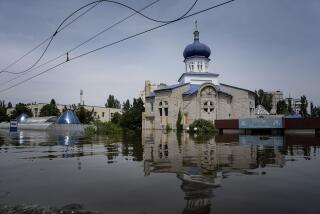Environmental Weapon Used Before : Strategy: The Soviets have studied ecological tactics for years. Iraqis used them on a small scale against Iran.
- Share via
WASHINGTON — When Kuwaiti oil began gushing into the Persian Gulf, the appalled Western World assumed that Saddam Hussein had discovered a new and devastating weapon that was immediately denounced as “environmental terrorism.”
But while President Bush has declared that there is “no rationality” to such tactics, they have in fact been under intense study for years by military strategists in a number of countries--particularly in the Soviet Union, where much of Iraq’s military got its training.
For the record:
12:00 a.m. Feb. 1, 1991 For the Record
Los Angeles Times Friday February 1, 1991 Home Edition Part A Page 3 Column 1 Metro Desk 2 inches; 63 words Type of Material: Correction
Oil Spill--A background box in Tuesday’s Times misidentified the international treaty that may have been violated by Iraq’s alleged release of oil into the Persian Gulf. The treaty is the Environmental Modification Convention of 1977. In addition, it is not clear whether the oil spill is governed by one of two 1977 protocols to the 1949 Geneva Conventions. France, Canada and Britain were mistakenly listed as having ratified those protocols.
References to “ecological weapons” have been appearing in Soviet military texts since about 1986, said Ilana Kass, a specialist on the Soviet military at the Pentagon’s National War College in Washington. She added that this research could be the inspiration, direct or indirect, for the Iraqi president’s desperate ploy of releasing millions of barrels of crude oil into Persian Gulf waters.
Methods of environmental warfare were spelled out most clearly, she added, in “Defense Against Weapons of Mass Destruction,” a 399-page, Russian-language textbook published in 1989. Though little-known outside the Soviet Union, 100,000 copies of the text were printed for use as a reference work by the Soviet army.
In that book, Gen. V. V. Myasnikov wrote that it is possible to “make use of destructive forces occurring in nature for military purposes.” He said the weapons open to military use include “flooding and pollution to disrupt navigation and disable irrigation and other hydro-structures and create obstructions in rivers, canals and other bodies of water.”
Kass said she was startled to find a discussion of such tactics--an apparent blueprint for igniting the current environmental crisis in the Persian Gulf--in an unclassified textbook.
“If research like that were done in Western countries, it would be very closely held, primarily because of the public backlash it would create,” she said.
Kass noted that thousands of Iraqi officials have trained intensively at Soviet military academies as part of their country’s contracts to purchase weapons from the Soviet Union.
Also, the Soviet Union has sent thousands of its own military personnel to Iraq as advisers to teach the Iraqis how to use the war machinery that it has sold them.
However, military analyst Anthony Cordesman insisted: “This kind of concept is not something one can blame on the Soviets.”
Iraq itself had employed the environmental weapon on a smaller scale during its eight-year war with Iran--a war that predated most references found in Soviet military textbooks. During the war with Iran, Iraq shifted the courses of rivers and ignited dammed-up marsh areas to create barriers against Iranian troops.
There are ample historical precedents for the use of the environment as a weapon.
When Japan invaded China in the late 1930s, for example, the militarily weaker Chinese forces bombed the dikes that held back the Yellow River, causing major floods.
“It’s the only thing they had against this modern force coming at them,” said Alfred Wilhelm, vice president of the Atlantic Council, a Washington-based public policy group.
BACKGROUND
One of two 1977 protocols that supplement the four 1949 Geneva Conventions on protecting civilians in time of war bans acts that lead to environmental disasters such as the oil slick in the Persian Gulf. It states: “The environment itself must be protected against widespread, long-term and severe damage. Methods of warfare likely to cause such damage and thereby jeopardize the health or survival of the population are forbidden.” Neither the United States nor Iraq has ratified the protocol, but Britain and France have, along with Kuwait, Saudi Arabia, Bahrain, Qatar, Syria, Italy and Canada among the allied countries.
More to Read
Sign up for Essential California
The most important California stories and recommendations in your inbox every morning.
You may occasionally receive promotional content from the Los Angeles Times.













